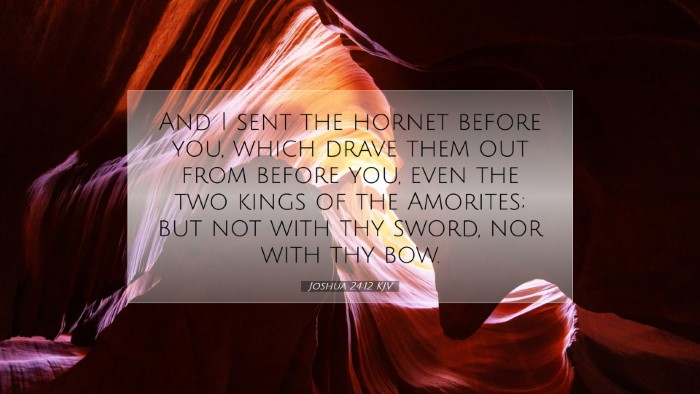Commentary on Joshua 24:12
Verse Context: Joshua 24:12 states, "And I sent the hornet before you, which drove them out from before you, even the two kings of the Amorites; but not with thy sword, nor with thy bow."
Introduction
This verse forms part of Joshua's farewell address to the Israelites, wherein he reminds them of the Lord's faithfulness in assisting them to conquer the lands of Canaan. It highlights the divine intervention that led to their victories, emphasizing that God was the primary agent behind their successes.
Insights from Matthew Henry
Henry emphasizes the miraculous nature of the victories described in Joshua 24:12. He posits that the “hornet” symbolizes divine terror used by God to clear the way for the Israelites. This metaphor not only illustrates God’s power but also serves as assurance to the Israelites that their battles were won through God’s initiative and not by military prowess.
- Divine Agency: “It was not by their sword or bow,” underscores the belief that true victory comes from God alone.
- Faith and Trust: The Israelites are reminded that their faith in God facilitated their triumph over enemies.
Reflections from Albert Barnes
Barnes provides a theological perspective on the use of “hornet” in this passage. He explains that this insect, often perceived as a small nuisance, here represents the larger forces of God that can drive out formidable adversaries.
- Symbolism of the Hornet: Reflecting on how God uses the least expected means to achieve His purposes.
- Encouragement for Believers: The mention of the hornet serves to encourage faith, suggesting that even small influences can be divinely orchestrated for great outcomes.
The Nature of God’s Help
Barnes points out the nature of divine assistance that does not always correspond with human understanding. He reflects on how the Israelites often relied on visible armies and physical strength, yet God's methods retained a hidden yet profound essence of sovereignty.
Comments from Adam Clarke
Clarke discusses the historical and cultural context of this verse, noting that the Israelites' enemies were not merely vanquished by force but systematically routed. He expounds upon the significance of God's direct action in the conquest of Canaan.
- Historical Context: Clarke underlines that the Amorite kings represented powerful opposition, which made the Israelites’ victory through seemingly trivial means all the more remarkable.
- Theological Implication: The victories reflect God's ongoing engagement and covenantal faithfulness towards His people.
Theological Themes
The overarching theological themes in Joshua 24:12 include:
- Divine Intervention: God's hand is evident in battle victories, emphasizing that spiritual success is invariably rooted in divine aid.
- Covenant Faithfulness: God’s commitment to Israel is seen through persuading enemies to flee—reminding believers of the importance of living in faith and obedience.
- Encouragement for Future Generations: The testimony of God's past actions serves as a source of encouragement for new generations to trust in His faithfulness.
Application for Believers Today
For pastors, students, theologians, and scholars, the call to recognize God’s active role continues to resonate.
- Faith in Challenges: Just as the Israelites relied on God for their victories, believers today must similarly recognize God’s hand in their challenges and victories.
- Understanding God’s Sovereignty: The narrative compels modern Christians to reflect on God’s sovereignty in their lives and communities.
- Living Out the Faith: The passage encourages active participation in faith while resting in the assurance that ultimate victory belongs to God.
Conclusion
Joshua 24:12 serves as a powerful reminder of the centrality of divine power in the lives of believers. It underscores the importance of recognizing God's actions in both historical and contemporary contexts, encouraging believers to place their trust in Him as the source of their strength and victories.


